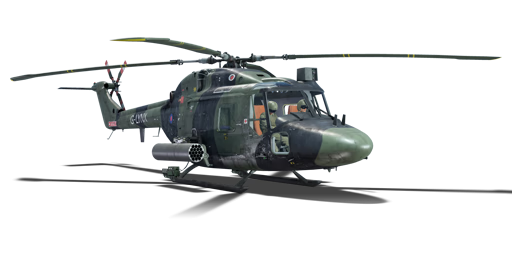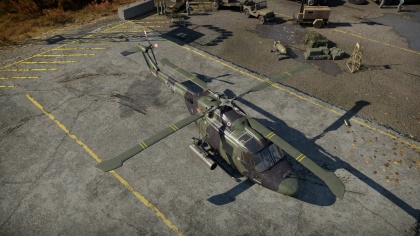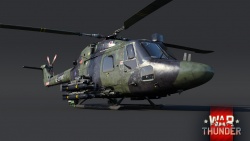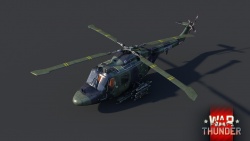G-LYNX
Contents
| This page is about the British helicopter G-LYNX. For other version, see Lynx AH.Mk.1. |
Description
The G-LYNX is a gift rank VI British helicopter
with a battle rating of 9.7 (AB), 10.7 (RB), and 10.0 (SB). It was introduced in Update 1.91 "Night Vision".
General info
Flight performance
Describe how the helicopter behaves in the air. Speed, manoeuvrability, acceleration and allowable loads - these are the most important characteristics of the vehicle.
| Characteristics | ||
|---|---|---|
| Stock | ||
| Max Speed (km/h at 1,000 m) |
Max altitude (meters) | |
| AB | RB | |
| ??? | ??? | 5400 |
| Upgraded | ||
| Max Speed (km/h at 1,000 m) |
Max altitude (meters) | |
| AB | RB | |
| ??? | ??? | 5400 |
Survivability and armour
Examine the survivability of the helicopter. Note how vulnerable the structure is and how secure the pilot is, whether the fuel tanks are armoured, etc. Describe the armour, if there is any, and also mention the vulnerability of other critical systems.
Armaments
Offensive armament
Describe the offensive armament of the aircraft, if any. Describe how effective the cannons and machine guns are in a battle, and also what belts or drums are better to use. If there is no offensive weaponry, delete this subsection.
Suspended armament
Describe the aircraft's suspended armament: additional cannons under the wings, bombs, rockets and torpedoes. This section is especially important for bombers and attackers. If there is no suspended weaponry remove this subsection.
Defensive armament
Defensive armament with turret machine guns or cannons, crewed by gunners. Examine the number of gunners and what belts or drums are better to use. If defensive weaponry is not available, remove this subsection.
Usage in battles
Describe the tactics of playing in a helicopter, the features of using helicopter in a team and advice on tactics. Refrain from creating a "guide" - do not impose a single point of view, but instead, give the reader food for thought. Examine the most dangerous enemies and give recommendations on fighting them. If necessary, note the specifics of the game in different modes (AB, RB, SB).
Pros and cons
Summarise and briefly evaluate the vehicle in terms of its characteristics and combat effectiveness. Mark its pros and cons in the bulleted list. Try not to use more than 6 points for each of the characteristics. Avoid using categorical definitions such as "bad", "good" and the like - use substitutions with softer forms such as "inadequate" and "effective".
Pros:
Cons:
History
Development on the Lynx began in the mid 1960s, when Westland sought a replacement for its existing Scout and Wasp helicopters, while also wanting to provide a more advanced alternative to the UH-1 Iroquois.
After some delays, the first prototype was ready for testing by the early ‘70s. In March 1971, the prototype conducted its maiden flight. In further sorties, the Lynx managed to break a number of world speed records for helicopters. Quite content with the Lynx’s performance, the British Army placed an order for 100 units of the type to be produced in the mid ‘70s. Subsequently, the Lynx received its official army designation ‘Lynx AH Mk.1’.
Since its introduction to service, the Lynx saw service primarily with the British Army and the Royal Navy in various different roles, including among others transport, armed escort and anti-tank warfare. Furthermore, the Lynx also saw service with countries such as the Netherlands, Norway and Argentina, while other countries like Germany, France, Denmark, South Korea, Brazil and Portugal, to name a few, still use variants of the Lynx today.
During their service, Lynx helicopters found themselves taking part in numerous conflicts, including the Falklands and Gulf wars, military interventions on the Balkans during the 1990s, anti-piracy efforts in Somalia and many more thanks to their ongoing service today. In total, around 450 Lynx helicopters of various modifications have been produced by 2009, with production still ongoing today.
- From Devblog
Media
- Images
See also
Links to the articles on the War Thunder Wiki that you think will be useful for the reader, for example:
- reference to the series of the helicopter;
- links to approximate analogues of other nations and research trees.
External links
| Westland Aircraft Limited | |
|---|---|
| Aircraft | |
| Fighters | Whirlwind Mk I · Whirlwind P.9 |
| Turboprop | Wyvern S4 |
| Helicopters* | |
| Attack | AH Mk.1 Apache** |
| Utility | Wessex HU Mk.5 · Scout AH.Mk.1 · Wasp HAS.Mk.1 · Lynx AH.Mk.1 · G-LYNX |
| *After World War II, Westland Aircraft focused on building helicopters and changed its name to Westland Helicopters. | |
| **Licensed AH-64D | |
| See Also | Boeing Aircraft |
| Britain helicopters | |
|---|---|
| Attack | AH Mk.1 Apache · Rooivalk Mk1F CSH · Superhind |
| Utility | Wessex HU Mk.5 · Scout AH.Mk.1 · Wasp HAS.Mk.1 · Lynx AH.Mk.1 · G-LYNX |







